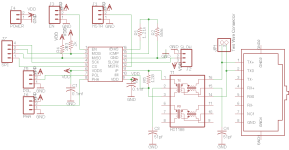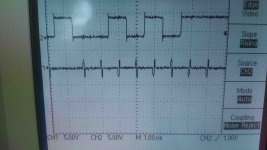NeighborVadim
100 µW
- Joined
- Sep 9, 2017
- Messages
- 7
Hello,
I've been working on a custom BMS utilizing the Linear 68xx chips. I have a BMS board working, but I am still trying to get the isoSPI communications bus working. I have designed a small board utilizing the LT6820 chip and the HX188nl pulse transformer, but to no avail. I am using this board with a confirmed working DC1894 demo board from linear, but I am getting no data back from the demo board. I have attached the schematic. Any help is welcome.
Thanks
I've been working on a custom BMS utilizing the Linear 68xx chips. I have a BMS board working, but I am still trying to get the isoSPI communications bus working. I have designed a small board utilizing the LT6820 chip and the HX188nl pulse transformer, but to no avail. I am using this board with a confirmed working DC1894 demo board from linear, but I am getting no data back from the demo board. I have attached the schematic. Any help is welcome.
Thanks



